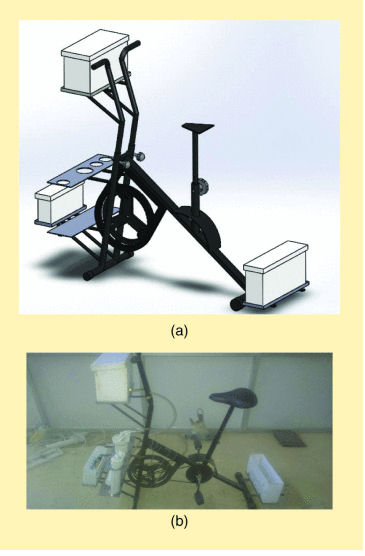 Figure 1.
Human powered water filtration system as an advanced frugal innovation. (a) Schematic. (b) Actual system. (Sponsor: Rural Technology Action Group (RuTAG) at IIT Madras).
Figure 1.
Human powered water filtration system as an advanced frugal innovation. (a) Schematic. (b) Actual system. (Sponsor: Rural Technology Action Group (RuTAG) at IIT Madras). Frugal innovations are all the rage. Their appeal stems mainly from lower costs to society at large. The grass roots nature of these innovations has in recent years been complemented by the appearance of frugality in sophisticated products realized through science and engineering. Such advanced frugal innovations (AFI) have appeared in a wide variety of sectors including education, healthcare, defense, astronomy, and particle physics [1]. A distinguishing feature of AFIs other than their low cost, is the application of cutting-edge science and engineering to achieve robust functioning. In other words, AFIs have been realized through the methodical application of scientific principles, as opposed to their grass-roots brethren, which are usually created on a makeshift basis.
Some examples of AFIs include the Square Kilometer Array; Spike missile; Tata Nano®; and the portable electrocardiogram, Mac 400® by GE [3]. Each of these innovations is the culmination of a scientific endeavor succeeding against the constraints of lower costs. The Square Kilometer Array in Africa is also representative of several AFIs developed on that continent, for tackling economic, weather, and health related issues that embrace advances in science while reining in costs. An AFI designed and fabricated by my group at the Indian Institute of Technology Madras (IITM) is shown in Figure 1. The frugal human-powered water filtration system depicted in Figure 1 will be utilized for obtaining potable water from various sources.
The quest to find solutions for improving living standards while preserving the planetary environment can be accomplished by large-scale adoption of AFIs. These innovations would significantly abet sustainable development by their frugal consumption of resources and an attendant lowered carbon footprint. This is because, generally, consuming fewer resources should result in products becoming net savers of energy, which is accompanied by lower emissions of greenhouse gases (GHGs). Such green credentials coupled with robust quality and low cost of these advanced innovations will make AFIs indispensable for both satisfying the needs of people and fighting planetary crises. Moreover, the low cost of AFIs has the potential to aid society at large in maintaining better lifestyles when the ranks of the unemployed swell due, for example, to human-made crises such as the 2008–2009 financial meltdown.
In the foreseeable future, advanced frugal innovations will achieve greater sophistication by being part of the fourth industrial revolution [4], through using technologies such as artificial intelligence, big data, Internet of things, and robotics. However, these innovations will prove to be beneficial only when their functioning is not compromised by frugality. Robust functionality of AFIs can be achieved by systematically following rigorous design procedures. Since creation of AFIs typically utilizes innovative advances in science and engineering, their design necessitates a highly skilled work force. Other than realizing AFIs, workers with advanced degrees will advance the boundaries of science and engineering by their very act of producing AFIs.
All in all, the advent of advanced frugal innovations will stimulate research and development (R&D) activities in various sectors. Deep scientific investigations will be required to unlock the potential of advanced innovations possessing quality of functionality, and realized through constraints on outlays for all-round sustainable development. In fact, frugal innovations of both grass roots and advanced types need rigorous application of science and engineering for quality products giving robust performance. The systematic application of scientific principles to frugal innovations [2] is imperative considering their increasing adoption in various sectors.
Author Information
The author is Associate Professor in the Department of Engineering Design, Indian Institute of Technology Madras, Chennai 600036, India. Email: balkrish@iitm.ac.in.
Read full version of this article HERE.






 JOIN SSIT
JOIN SSIT